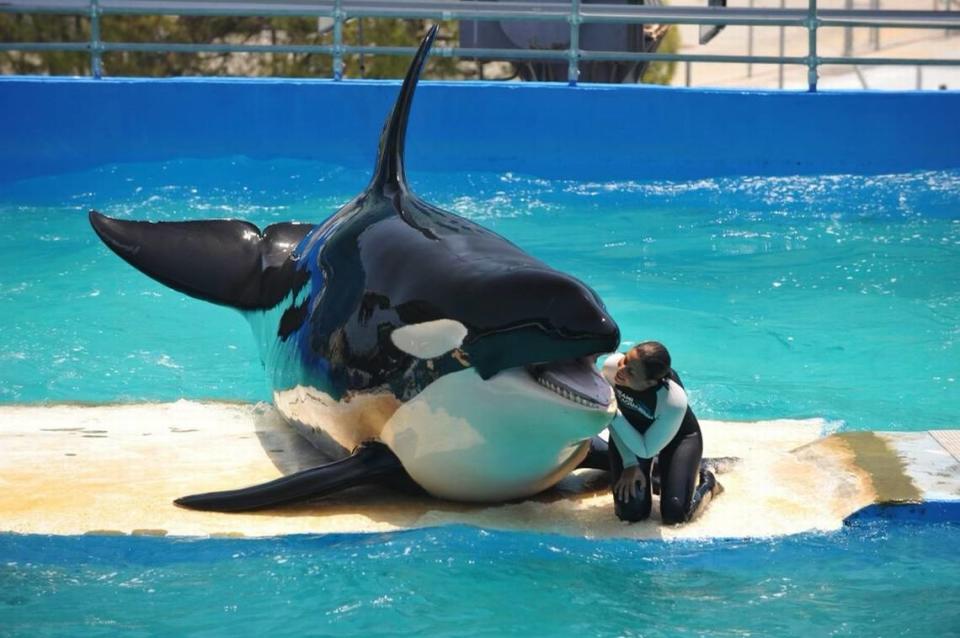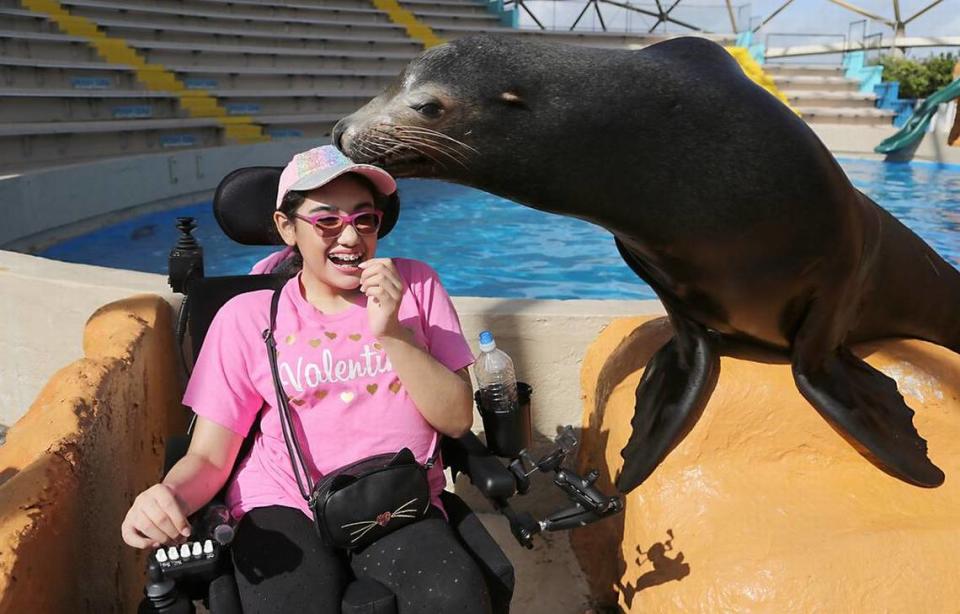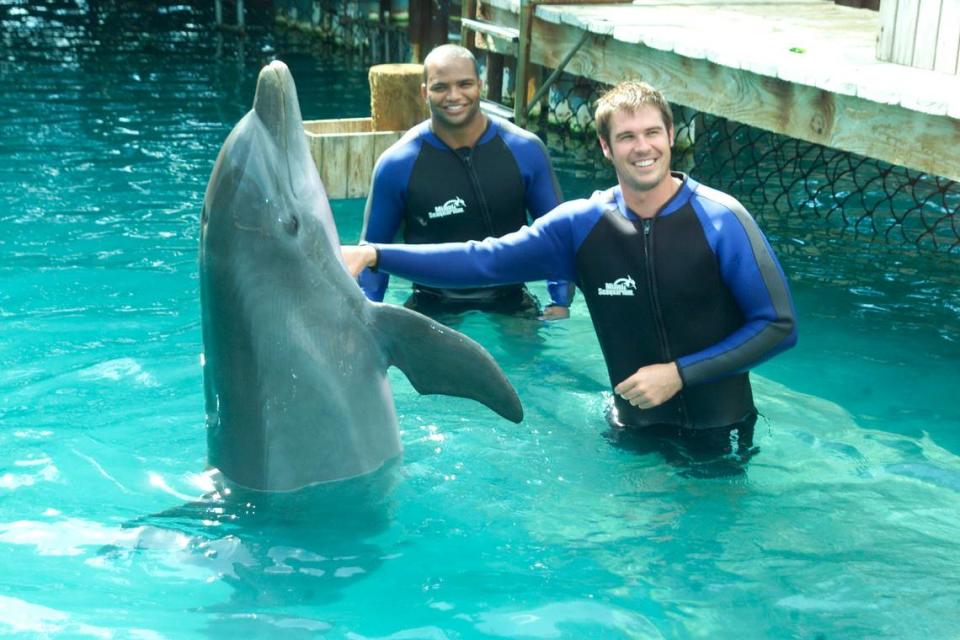
A sea lion going blind from cataracts, rusty bird cages, mold in the penguin house, ants in a vitamin cabinet, one dolphin swallowing a nail, another jumping a barrier between pools, and flamingos wading in dirty water were among the problems cited at Miami Seaquarium in an inspection report released Wednesday.
Seaquarium, the 55-year-old Virginia Key marine park, formerly home of the late Lolita the killer whale, also lost its accreditation from American Humane’s animal welfare certification program, which leaves it in violation of its lease with Miami-Dade County.
Seaquarium’s only remaining certification, as listed on its website, is from the Alliance of Marine Mammal Parks and Aquariums (AMMPA). The lease requires a minimum of two certifications by AMMPA and by American Humane or a similar third-party validated program. Seaquarium did not renew its International Marine Animal Trainers’ Association certification in September.
Miami-Dade Mayor Daniella Levine Cava announced plans to terminate Seaquarium’s lease last month. Seaquarium, run by the Mexico-based Dolphin Company, issued a rebuttal two days later, and released a statement Thursday saying it “remains committed to upholding the highest standards of animal welfare and providing a safe and enriching environment for our resident animals.
“We continue to operate under the lease agreement as executed by Miami-Dade County and remain open to the public.”
While the Dolphin Company says it has been trying to upgrade the aging park since it took over two years ago, it has been unable to stem successive critical reports from U.S. Department of Agriculture inspectors, who have found underfed dolphins, inadequate veterinary equipment, persistent staff turnover and unfilled positions, mishandled animals, unhygienic conditions and deteriorating enclosures at Seaquarium.

Since Lolita, also known as Tokitae, died of kidney failure and old age on Aug. 18, three Pacific white-sided dolphins and three manatees were removed and transferred to other facilities, and a dolphin named Sundance died after vets noticed he was suffering from stomach pain.
READ MORE: Lolita, the Miami Seaquarium orca, died Friday as hopes grew she would leave for the sea
Animals not cared for properly, report says
During a Jan. 9 inspection, USDA issued a citation for “lack of appropriate veterinary care for 25 animals,” and 10 days later warned Seaquarium it would confiscate four of the animals. But Seaquarium subsequently “took necessary corrective action,” the USDA said.
“The last USDA inspection was in January. As reported by the USDA spokesperson, Miami Seaquarium is in compliance with federal Animal Welfare Act regulations,” Seaquarium stated Thursday, adding it is proud of its staff, “whose efforts have been commended by the USDA.”
Levine Cava responded to Seaquarium’s stated intention to keep operating by saying county lawyers are seeking to meet with Seaquarium’s lawyers to “discuss possible next steps.” The county, notified Thursday of Seaquarium’s loss of American Humane certification, is also addressing the lease violation with the Dolphin Company, which signed an amended lease that gave the county more oversight in March 2022.

“Although the Seaquarium was recently able to avoid the confiscation of some of the animals, I remain concerned about the poor quality of animal care that has been repeatedly documented by the USDA since last year,” said Levine Cava, who initially gave Seaquarium 45 days to fix problems. That deadline passed on Dec. 17. “Additionally, there are currently four active Unsafe Structures cases that continue to violate the terms of our agreement.
“The safety and well-being of all the animals that are under the care of Miami Seaquarium continues to be of utmost importance for my administration.”
The People for the Ethical Treatment of Animals, which has long referred to Seaquarium as an “abusement park,” again called for the county to close it.
“PETA is calling on officials to stop procrastinating and shut down this wretched hellhole immediately so that the animals imprisoned there can be sent to reputable facilities where they can finally get some relief,” said PETA President Ingrid Newkirk.
Dolphin ingests 2-inch nail
During the October inspection, USDA officials were most worried about Sushi, according to a report released Wednesday. Sushi, a female California sea lion, had been rubbing her eyes and was refusing to eat “due to eye pain.” Veterinarians had previously ordered cataract surgery but it had not been scheduled.
“Failure to ensure that the attending veterinarian has appropriate authority over the veterinary care, including prevention, diagnostics, and treatment of the animals, can lead to unnecessary stress, discomfort, and suffering of the animals,” inspectors wrote.
READ MORE: Seaquarium cited for staffing, animal safety issues in latest federal inspection report
Ignoring or delaying the attending veterinarian’s directives has been cited as a recurring problem since 2021, when two vets were fired because they said they were acting as whistleblowers to the USDA.
The October report said staff did not have access to equipment necessary to perform an ultrasound or endoscopy or to administer anesthesia in an emergency. A vet said she had no gastroscope and was unable to do certain types of exams on three bottlenose dolphins or weigh manatees.

A dolphin named Ripley ingested a 2-inch nail, mangrove pods and shell pieces while a dolphin named Bimini had a broken bolt in her mouth.
“Enclosures that are not kept in good repair may produce foreign material which could be ingested and become injurious to the animals,” inspectors said.
The indoor enclosure housing nine penguins had “numerous spots of black growth as well as areas of bubbling and peeling paint that is starting to droop,” inspectors said.
In the Tropical Wings section, bird cages housing parrots, macaws and cockatoos had flaking paint and sections where “the metal is rusted through.”
In a trailer providing indoor housing for parrots “there is a noxious odor permeating the air,” even after it was cleaned and two air purifiers were installed.
In the area housing 29 flamingos, inspectors found stagnant, murky water with green algae growing in it. Staff said they flush out the muddy pond once a week but that it’s difficult to keep clean.
The report noted the behavior of two dolphins, one named Onyx who jumped the barrier between pools to join another social group three times.
A dolphin named Zo was kicked in the mouth by a guest “kicking frantically” as Zo circled the guest with his mouth open and ignored two hand slaps from trainers telling Zo to withdraw from the interactive session at Flipper Stadium.
“During public exhibition, any animal must be handled so there is minimal risk of harm to the animal and to the public,” the report stated.

EMEA Tribune is not involved in this news article, it is taken from our partners and or from the News Agencies. Copyright and Credit go to the News Agencies, email [email protected] Follow our WhatsApp verified Channel









